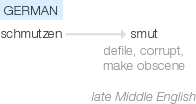Smut
late Middle English (in the sense ‘defile, corrupt, make obscene’): related to German schmutzen ; compare with smudge1. The noun dates from the mid 17th century.
wiktionary
From Middle English smutten(“to defile, debase”), related to German Schmutz(“filth, dirt, smut”) and schmutzen(“to make dirty, stain”). This etymology is incomplete. You can help Wiktionary by elaborating on the origins of this term. Doublet of schmutz.
Compare also Old English smitta(“smear; blot; mark; stain; pollution”), Old English besmītan(“to besmut; defile; dirty; pollute; contaminate”).
etymonline
smut (n.)
1660s, "black mark, stain," from verb smutten "debase, defile" (late 14c.), later "stain or mark with soot, etc." (1580s), cognate with Middle High German smotzen "make dirty," from West Germanic *smutt- (source also of Middle High German smuz "grease, dirt;" German Schmutz "dirt," schmutzen "to make dirty"). The meaning "indecent or obscene language" is first attested 1660s.
